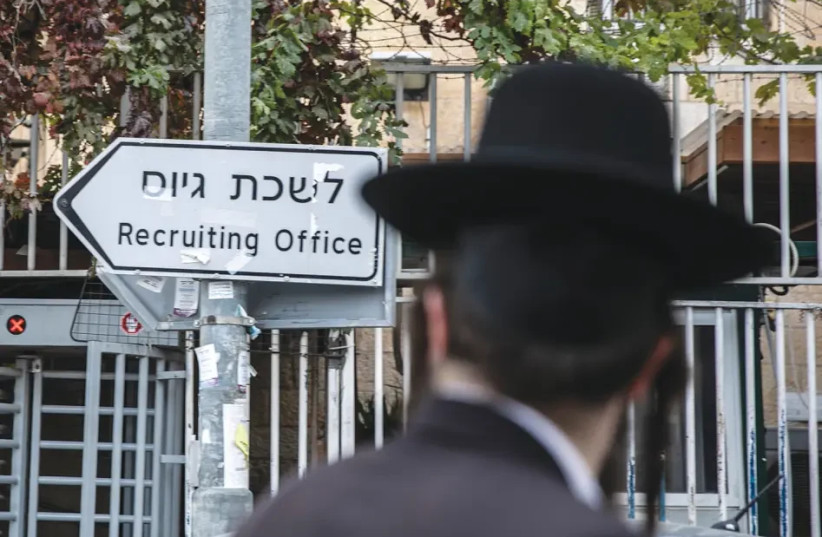How Ben Gurion’s pragmatic decision led to Haredim draft exemption
Prime Minister David Ben-Gurion made a significant decision at a Provisional State Council meeting not to draft yeshiva students, setting in motion a policy that would shape Israeli society and provoke decades of debate over military service exemptions.
On Friday, early October 1948, two days before Rosh Hashanah (the Jewish New Year) 1948, the Provisional State Council convened for a meeting. The first Rosh Hashanah in the fledgling state’s life was marked by an atmosphere of holiness and new beginnings, however, it was also laced with tension and concern about what lay ahead in the difficult war for Israel’s independence.
“Building the State and Judgment Day” was the headline of an article in the newspaper Davar, a headline which encapsulated the atmosphere of those days.
The day before, Professor Chaim Weizmann arrived in Israel, the President of the Provisional State Council, and it was announced that he would be the first President of the State of Israel. Everything was unprecedented and historic.
For example, the “Skymaster” aircraft on which Weizmann arrived in Israel was “the first Hebrew airliner registered with Israeli aviation authorities,” highlighted in the HaTzofe newspaper. “The double working crew of 14 people – all of them Jews,” noted the article.

At that same meeting of the Provisional State Council, David Ben-Gurion – the Prime Minister and Defense Minister at the time – reported his decision not to draft yeshiva students. Seven months earlier, even before the declaration of independence, Yisrael Galili, General Chief of Staff, instructed division commanders that “yeshiva students, according to approved lists, are exempt from military service.” This directive, he noted, applied only to 1948.
Shaping Israel’s religious-secular relations
However, at the beginning of 1949, Ben-Gurion extended the directive. Shortly after, he reported for the first time the number of exemptions from enlistment, leading MK Meir Grabovsky (Argov) to ask him in a Knesset Security Committee meeting, “Is it true that yeshiva students are not obligated to enlist, and is it true that as a result, their number of students increased?”
Ben-Gurion replied, “The members of the association’s defense ministry turned to him, saying that there are 400 yeshiva students [ … and that] drafting them will result in the yeshiva closing.”
The journalist and historian Tom Segev argued in his biography that Ben-Gurion’s policy of not defining the relationship between religion and state in law was one of the principles on which he based his dealings with religious leaders. According to Segev, Ben-Gurion believed in avoiding theological conflicts as much as possible and managing ideological divisions politically.
Another principle that guided the first Prime Minister in his relations with the religious public was recognizing that there was no symmetry between religious and secular Jews. In other words, religious Jews are fervently protective of their faith foundations, while most secular Jews are less so. The result of this principle was a much greater tolerance among secular Jews, as manifested in Ben-Gurion’s agreement to exempt yeshiva students from military service.
It did not take long for the issue to resurface in public discourse, especially with the increasing number of exemptions based on “Torato umanuto” (their Torah study is their profession in Hebrew.)
In 1958, during his second term as Prime Minister, Ben-Gurion wrote to the Chief Rabbi, Yitzhak Herzog, the grandfather of President Isaac Herzog, a letter that implied he originally intended to exempt yeshiva students from military service to preserve the world of Torah, which had nearly disappeared during the Holocaust.
Yeshiva students and military service in Israel
Ben-Gurion acknowledged his original intent underwent a significant change over the years, stating, “When I exempted yeshiva students from military service ten years ago, their numbers were small and, as I was told then, this was the only country where Torah scholars remained.
“Nevertheless, I am pleased to note that yeshiva students participated in Jerusalem’s defense like other young people of the city. During the War of Independence, Haredim enlisted to defend the land – not just in Jerusalem,” wrote the Prime Minister to the Chief Rabbi.
Ben-Gurion continued, “The situation has since changed. Yeshiva students have multiplied. I don’t know if there’s any basis for blame because some go to yeshiva to evade responsibilities. I want to assume this claim is unfounded. But it’s undeniable that over time, yeshiva students have increased, numbering in the thousands.
In foreign countries, non-Jews don’t rely on Israeli defenders. Here, we are all Jews, and our security depends solely on us. This is primarily a significant moral question: Is it right for one mother’s son to risk his life for the homeland, while another’s son studies safely at home, when most young Israelis sacrifice themselves?”
Over time, the exemption system evolved into deferment arrangements, gradually increasing the number of those included. By 1975, their number reached 7,357. The slow drip that led to the growth in the volume of yeshiva students who did not enlist developed into a significant flow after the political upheaval in 1977. Menachem Begin’s government expanded coalition agreements with ultra-Orthodox parties to exempt them from military service.
Now included in the arrangement were also students of yeshivot who focus on secondary education and professional training. One clause in the agreement stipulated that “there shall be no limitations on the number of yeshivot or the number of students who can study in a yeshiva.”
Every few years, the need to regulate the issue resurfaced, and meanwhile, the number of exemptions due to “Toratam Umanutam” (their Torah study is their profession in Hebrew) has reached approximately 63,000. Like other unresolved conflicts in Israeli society, it was eventually brought before the contested decision of the Supreme Court.





Comments are closed.